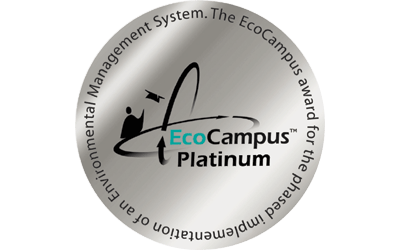
The University is currently a member of the EcoCampus scheme and has achieved EcoCampus Platinum Award for the entire campus. Our Environmental Management System is also certified to ISO14001.
Policy approved February 2023.
Corporate Social Responsibility
The Environment and Sustainability Team at the University of Lincoln are working to develop a range of programmes to enhance social responsibility at the organisation.
Annual Report:
The University Estates Department produces an annual report on its environmental performance. This report details factors such as the amount of energy used, the level of carbon dioxide emissions and amount of waste generated. The report has details of sustainability projects and outlines plans for the coming year. The University makes an annual return of environmental data to the Higher Education Statistics Agency.
» Annual Environmental Report 2021
» Annual Environmental Report 2020
» Annual Environmental Report 2019
» Annual Environmental Report 2018
Ethical Investment Policy
The University published its first Ethical Investment Policy in September 2014. The Policy sets out how the University will respond to ethical, environmental and social issues in the management of its funds and investments. A full copy of the Ethical Investment Policy can be seen here:
The Policy states that the University of Lincoln “will use its best endeavours not to invest in companies whose activities could be seen to endanger individuals or groups of people, or whose activities are inconsistent with the Mission and Values of the University, its community and its wider stakeholder network”.
The Policy sets out a series of areas that the University of Lincoln will not invest in:
The University will use its best endeavours not to invest, directly or through collective funds, in organisations with activities or operations which:
- are injurious to health;
- may destabilise community cohesion;
- may threaten international stability;
- may contribute to the development and maintenance of poverty;
- may contribute to the abuse or exploitation of children through working practice or by any other means; or
- contribute to any form of illegal activity under UK law or other legal jurisdiction.
The Ethical Investment Policy links closely with the University’s Code of Ethics, which includes the following statement on Environmental Sustainability:
“The University aims to minimise its environmental impact and to use resources in an efficient and sustainable manner and is committed to establishing a culture where environmental sustainability is continually improved. The University promotes environmental awareness among its staff, students, suppliers and contractors in order to ensure that everyone has a role in minimising adverse effects on the environment.
The University pursues a policy of ethical investment of its funds and through its procurement processes ensures its suppliers conform to ethical standards.”
The full Code of Ethics can be seen here.
Sustainability Leadership Scorecard
We are using the Sustainability Leadership Scorecard (SLS); a self-assessment framework developed by the EAUC and AUDE, which uses target setting, performance improvement, evaluation and reporting to assess the extent to which sustainability is embedded in an institution.
A baseline assessment of our organisation has been produced and we’re currently using the scorecard to identify priorities and to shape targets for improvement. From this, we will work to integrate these into our Environmental Management System targets and action plan. We’ll be posting updates on our progress.
Sustainable Procurement
The University’s Environmental & Sustainability Strategy sets out to “ensure that environmental and sustainability issues are taken into account in the appropriate purchasing decisions of the University.”
To consider sustainability issues the Environmental Team has been working with the Procurement Team to develop a series of questions for contractors on environmental issues. This approach is based on the DEFRA Flexible Framework on Procurement.
The Sustainable Procurement questions are tailored to the types of goods or services that are being purchased. The Environment Team will then be involved with assessing whether an appropriate answer has been provided.
The procurement questions have been specifically designed for tenders for the following types of contract:
- Construction
- Design consultant
- Goods
- Services
- Repair/ maintenance
There are further procurement guidelines on the University’s procurement webpage; which cover sustainability issues.
- Sustainable Purchasing Principles
- University of Lincoln Procurement Objectives
- Procurement – Corporate Social Responsibility Guidelines
The University has examined its Scope 3 carbon dioxide emissions due to procurement activity and an annual report is produced on this as part of the Investors in the Environment Manual – link.
